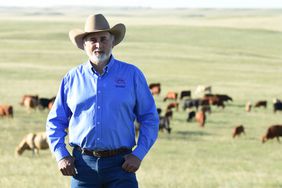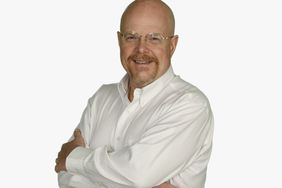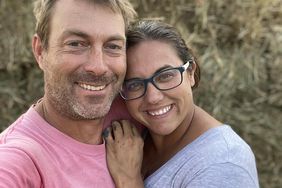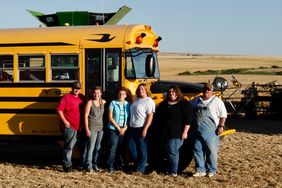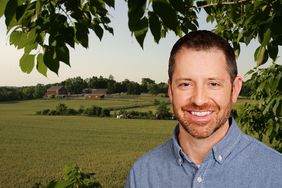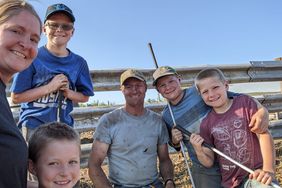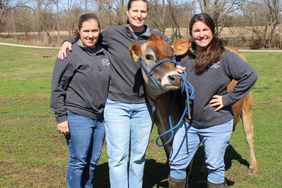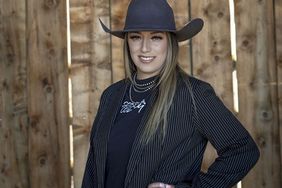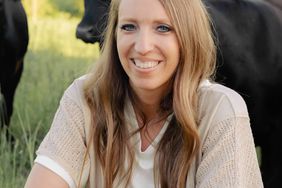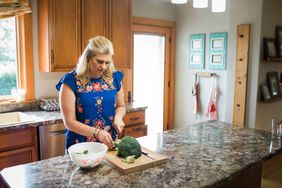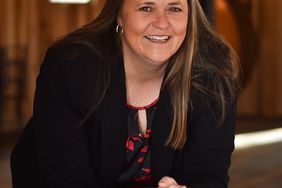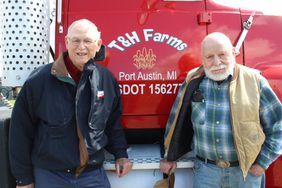:max_bytes(150000):strip_icc()/Clayton-Mooney-inside-Ames-Iowa-farm-0dfe15f15c5d4bf7921f5c57dd175cc9.jpg)
Natalina Sents Bausch
Sporting long curly hair, a sleeve of tattoos, and running shoes, Clayton Mooney doesn’t look like your typical Iowa farmer. He isn’t. For one, Mooney’s farm is surrounded by a parking lot. His crops — lettuces and microgreens — grow inside an old Fazoli’s building in Ames, Iowa. Drive-through customers consume salad and smoothies assembled hours after harvest from ingredients grown indoors at Clayton Farms.
Growing up in Blakesburg, Iowa, with 40 acres of row crops and horses, Mooney didn’t feel pressure to return to the farm after college. His path back to Iowa agriculture has been a global experience teaching him, “There are a million different ways to do something.”
His original plan included studies in business economics and a law degree, but he rerouted to a poker career in Ireland. Lessons in sample size, the pressure of making decisions, and how quickly money can come and go were learned over hands of cards rather than textbooks.
Later, he reenrolled at Iowa State University with a different mind-set. “You’re not paying tuition for a skill set. You’re paying tuition for a network,” he says. He aligned himself with a number of incubators and accelerators. Mooney found community in the College of Agriculture’s entrepreneurial organizations for students that steered him back toward his roots.
SF: Tell me about your entrepreneurial journey.
CM: It really started about a decade ago. I moved back to Iowa from living in Ireland, and jumped headfirst into startups and co-founded my first company in the food technology space. I kept coming back to the question of food security and what does the food supply chain mean in our own backyard.
Years later, I posed that on a blog. How do we create access to the food people deserve? Thankfully, [my business partner] Danen Pool reached out and said, “I have the answer to that. It’s indoor farming.”
Most indoor farms get it wrong. They fall into one of two traps. They often want to overengineer, and add all the bells and whistles. They want to have the vertical farm of the future. It’s humanless, run by robots, and everything is automated. The problem with that is it often pushes your payback period too far, and you can’t reach profitability before you’re forced to shut down.
The other trap indoor or vertical farms often fall into is having a very lean approach to growing, which is great, but then they turn around and they want to be the wholesaler and basically treat everything as a commodity. Then they end up with the smallest slice of the pie. That also pushes out their payback period.
SF: How are you avoiding those pitfalls with your farm?
CM: Danen and I wanted to take the approach of a smaller footprint. We focused on building the growing equipment and the software that runs that equipment. Then we wanted to put the equipment within communities, as close to people as possible.
:max_bytes(150000):strip_icc()/Clayton-Farms-Drive-Through-DSC_3658-2bdf36c16ebd438ca1fbb8b87323716e.jpg)
Natalina Sents Bausch
SF: With that vision in mind, what came next?
CM: The next step was to work with chefs, produce managers, and restaurateurs to develop the flavor profile of the foods. We focused on leafy greens like our lettuces, arugula, microgreens like broccoli, radish, and pea shoots, and then vine crops such as cherry tomatoes. That really helped us develop the flavor profile that we needed. Today we can grow 200 plus foods across our technology stack without having to reinvent the wheel.
Next, we had to prove our technology could work in multiple markets. We launched a subscription box farm in Ames in the Iowa State University Research Park. We would harvest from our farm and deliver directly to consumers’ doorstep, just a few hours postharvest. We own the supply chain from the moment we start a seed in our nursery to the moment we deliver the fresh food on someone’s doorstep.
Once we’d proven it could work in Ames we said, let’s go to a little bit bigger market. Toward the end of 2022, we launched the same model in Edina, Minnesota, to serve the Minneapolis/St. Paul market. Thankfully, that took off and we were able to prove that our technology could work, it could scale, and it could be monitored and run remotely.
SF: And then you pivoted again?
CM: The next step for us was finding the model that’s most efficient. That’s where we’re at today, at our drive-through restaurant.
A lot of restaurants and dine-in is shrinking. A lot of restaurants will go under this year. A lot of people are used to ordering via DoorDash and a very busy go, go, go lifestyle. So, we asked ourselves, what if we took over a vacant restaurant, converted the dine-in space to the farm, and by default, could serve the world’s freshest salads?
It has worked so well for us that we’re taking this model and launching more of our drive-through farms in the coming months.
:max_bytes(150000):strip_icc()/Clayton-Farms-menu-f41d108353a6458c875a39a968fbbd42.jpg)
Natalina Sents Bausch
SF: What was it like to convince people to believe in a drive-through salad farm they’d never heard of before?
CM: We’re a six-year-old company. When Danen and I started, we raised a very, very small friends and family investment round. We talked with 66 people, and three said yes.
Those three individuals believed in us in 2017 when it was just two guys and a prototype. Today, the team is about two dozen team members across all locations. We’ve gone the route of raising venture capital, which means we’ve had to have a plan for how this scales. How can we get out there into the world on a national or global level?
Every day is day one for us, especially with this new drive-through model. I think we can exist anywhere a Jimmy John’s exists, so we want thousands of these locations to help us scale. Something that keeps me excited is the fact that farming will always have its place in the world, but it’s up to the next generation of visionaries to think about how it evolves.
:max_bytes(150000):strip_icc()/Growing-greens-Clayton-Farms-DSC_3676-70d1026079654ff3b1c15437b4170a4c.jpg)
Natalina Sents Bausch
SF: Tell me more about the way you see agriculture evolving.
CM: Urban agriculture isn’t going anywhere. Every year there are more and more individuals wanting to know where their food comes from and all of the inputs. It’s exciting to see more people interested in agriculture who have no background in it. I think that’s healthy for a different set of views coming into the space.
Traveling has provided an entirely different perspective. From living abroad and trying to build distribution in developing regions, you come to realize that there are a million different ways to do something. I’ve found, especially as we’ve built our team, it’s really healthy for your own ego to bring someone in with a different or more diverse background to tell you what they observe and what they think is a solution to the problems.
SF: Farmers wear many hats. Tell me about the hats you wear in Clayton Farms.
CM: When Danen and I started the company, we were doing everything from the seeding, transplanting, harvesting, cleaning, and working with customers when we had a subscription business model. We were the ones doing the first deliveries. As we would walk up to someone’s doorstep and we would say, ‘“Hey, here you go. Do you have any feedback for us?” People would say, “Please tell the owner, I like the pea shoots, but I want to switch to micro radish.” As soon as we said, “We’re the owner, we can do that for you right away,” it built this bond and circle of confidence. I’ve always been paranoid about how we don’t lose that.
Today I wear fewer hats than I did even a year ago. I had to learn the hard way that things break if you don’t delegate. If you have your own farming operation, whether that’s in a city or at home on your family farm, you’ve probably had to learn every in and out of the business. You’re the expert. You have to ask yourself, do you want it to scale? If the answer is yes, you have to put full faith and trust in someone else. I think it’s healthy for us to get out of our own way.
It’s been fun to go from me building the P and L statements to our VP of finance and procurement, with a background of managing much bigger budgets, coming in and taking over my mess and running with it.
SF: If you could sit down with little Clayton, what would you tell him about what you do? Would he believe you?
CM: I don’t think he would believe me.
I take the approach that life is so short, that whatever you’re doing, you have to make sure it’s worth suffering for. You have to be able to change direction, and you have to be OK with that. Maybe stubborn on where you want to end up, but lose on some of the details about how you want to get there.
As a start-up, we say we don’t have time to learn from our weaknesses. We all have to lean in and play to our strengths.
Danen and I are a yin and yang cofounding team. His background is in plant biology and mechanical engineering. Mine was poker and numbers. You don’t want me around power tools and Danen doesn't enjoy spreadsheets.
Play to your strengths. I was born with a speech impediment. I took speech therapy, but couldn’t really speak properly until 8 or 9, and my mind naturally worked in numbers. From a young age, I was drawn to counting everything — from the tiles on the ceiling to the planks of the floor. This fascination with numbers led to applying it to real-world scenarios.
I was a pretty big comic book and gaming nerd. At 14, I was playing on the Pro Tour for this card game, Magic the Gathering. From there I transitioned into online poker. To me, it was a video game about statistics and reductive reasoning. I was fortunate that poker took me from the World Series of Poker in Las Vegas to living in Dublin, Ireland, and traveling to the European Poker tour stops.
SF: What lessons from poker have helped with your business?
CM: I played primarily online poker in tournaments. With tournaments, you would lose money three out of four days. The days that you won, you would gain everything back and have a positive return on investment. It prepared me to be, I hate saying it this way, but let down most of the time.
In poker, I had moments where I won a year’s salary in a day, and I lost a year’s salary in a day. That helped me realize money goes very quickly.
In poker, you meet individuals who, if they see the writing on the wall, and they want to make the correct mathematical decision, they do. It's very similar for businesses where the writing is on the wall that something has shifted or the market has changed, you have to change the direction. Making a data-driven decision is absolutely key for survival.
:max_bytes(150000):strip_icc()/DSC_3715-33c1d31718234c0583ad1bdd7520b0c7.jpg)
Natalina Sents Bausch
SF: You talk about having a tolerance for being let down, but it seems you’re also able to pick out the lessons from your disappointments. How did you learn to do that?
CM: I do a lot of ultra-trail running. I’m running in the woods, thinking through things by myself, no cell service, so that helps.
I’m a pretty outspoken proponent of mental health. Someone should go to a therapist to be proactive, not reactive. When you go to therapy, you’re paying a professional who understands how people’s minds work. They’re helping you pinpoint how your mind works. It’s incredible. It helps me understand my own operating system. If you understand that, then you understand yourself. If you understand yourself, you can probably be a better leader, a faster decision maker, and be realistic in those scenarios.
SF: Have there been any tools or experiences that have helped you identify your strengths?
CM: I have a founder coach, a running coach, and a therapist. Three individuals holding me accountable and helping to understand why my mind arrives at this conclusion has been key. Mentors have been important, too. Find someone who is two to three years ahead of you in the journey that you’re taking. They’ve experienced it, it’s somewhat fresh in their mind, or maybe they have some PTSD about the situation, how they had to work through it.
Another thing is, jump in headfirst. Naivete carries you a long way. If I knew half of what I know about building the business over the last six years, I probably would’ve never even started.
Also, always put your customer first. Hear what they want so you can prove or disprove your own assumptions.
:max_bytes(150000):strip_icc()/NatalinaBausch-6-06b14ffcaa32491e802c91c09e7fc867.jpg)

